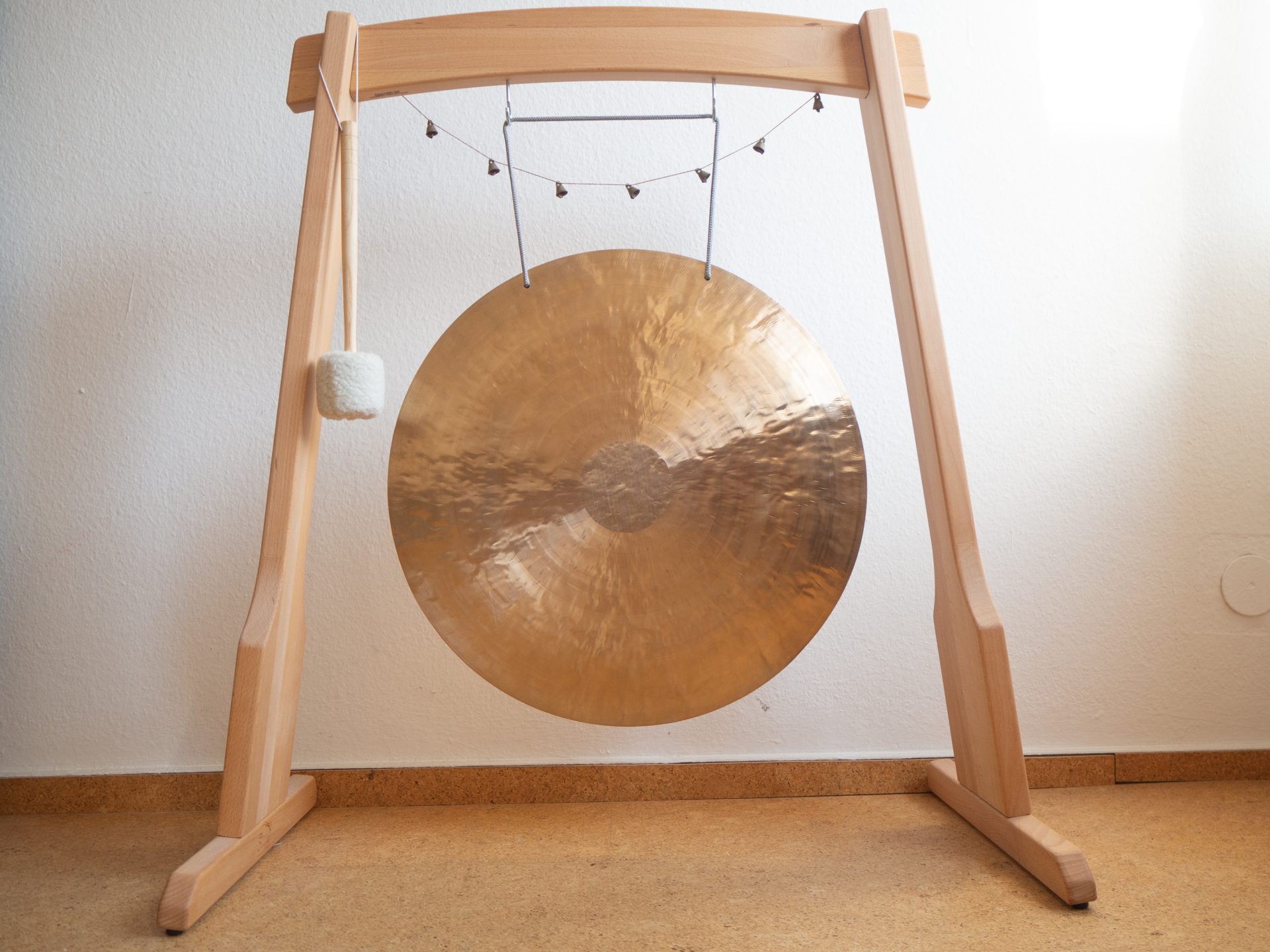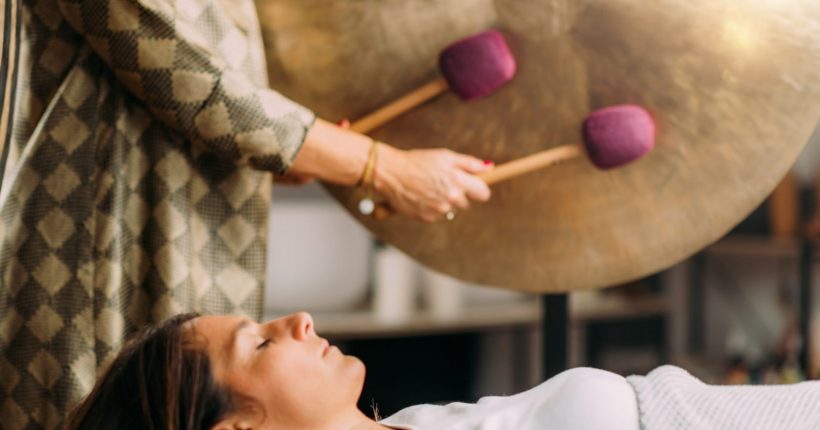cheap atarax uk without prescription
Once the preserve of retreats and festivals, gong baths are going mainstream – and for good reason, says Strong Women editor Miranda Larbi.
A few weekends ago, I found myself lying in a dimly lit room in Belgravia, letting the sound of gong music wash over me. With each bang, I felt myself drifting deeper and deeper into a dream-like space – feeling like I was falling backwards through space. I had no sense of time, no nagging ‘what’s next on the list?’ thought. It was an hour of pure bliss.
Once the session finished, I felt emotional. I can’t tell you what I thought about during the hour but I do remember the facilitator telling us that the session would be focused on the heart chakra, and that we should imagine ourselves being surrounded by a giant golden pyramid. For the rest of the day, I felt really calm and happy. Relaxed but energised.
You may also like
What is sound therapy? This relaxation technique is perfect for people who struggle with meditation
That, my friends, is the power of a gong bath. I first came across the concept years ago at Bestival – a totally different experience (it was the longest sleep I’d had over the three days). Today, these ceremonies seem to be everywhere.
In fact, a local church space hosts regular gong ceremonies with The Psychedelic Society. It’s a totally different vibe to that experience at Re:Mind in Belgravia; it’s BYOB (bring your own blankets) for one thing. Herbal tea is served before everyone gets into their sleeping bags and allows noise to wash over them for 70 minutes. It’s far more of a community activity, with groups of friends, families and individuals coming together on a Monday evening.
Every time I’ve gone to that one, I’ve felt like my mind has been put on a dishwasher setting. With every note and vibration, another thought seems to bash its way into my consciousness. The moment the music stops, the thoughts stop; I never remember what I was thinking about.

It really seems like gong baths are having a moment. I’ve heard of lots more people going to them in all kinds of makeshift halls and gyms. So, why are gong baths gaining such popularity and what’s the benefit of absorbing all those vibrations?
Why is gong going mainsteam?
Kat Bumbul from The Psychedelic Society believes that gongs are having a moment because baths are an accessible form of meditation. “They are the easiest form of achieving a gently altered state of consciousness, and are an amazing remedy to relax. They have an instant effect on the wellbeing of a person, and that can last for a few days or longer.”
The effects of a gong bath can be super subtle (going home to have a great night’s sleep) or profound (perhaps a revelation). The key is not expecting anything to happen. And, of course, the environment matters: a gong bath in a cosy, intimate, dark space is totally different to a cold, draughty hall.
Benefits of gong baths
Instant stress relief
At a time when so many us are struggling with burnout and stress, having an hour or two to simply lie back and listen is worth its weight in gold. “Sound healing relaxes your body and quiets your mind to reduce stress-related issues and improve your health,” explains Maggie Paterson, co-founder of Sunsetbay Retreats.
“As calming sounds surround and flow through your system, you restore harmony, balance and flow within your mind, body, and soul. This can lead to a renewed sense of happiness, purpose and wellness.”
Deep relaxation
“The most common benefits of gong baths are deep relaxation, improved sleep and feeling recharged,” explains Bumbul. “One good gong bath might have an effect equal to months or even years of daily meditation practice. They affect our state of consciousness serving as a bridge to touch or reach something deeper inside us which feels primordial, subtle and often mystical and blissful.”
Enhanced mood
Paterson says: “Though you may not realise it, the sounds you hear throughout the day profoundly impact your mood. For example, noise from a building site can leave you feeling irritated and on edge, whereas the tranquil sounds of nature elicit feelings of calm and peace.
“That’s why it’s essential to be intentional about the sounds you allow into your space. Luckily, sound healing provides an opportunity to enhance your mood with high-vibe frequencies that encourage feelings of wellbeing. Listening to 30 minutes of live music increases dopamine levels, makes you feel happy and motivated.”
You may also like
“I tried dancing for 3 minutes every morning to see if it would improve my energy and mood– here’s what happened”
Better access to emotions
Bumbul claims that gong baths can, for some, have a similar effect to a psychotherapy session – taking the mind to moments in the past or present and “bringing insights from a more objective and wider perspective”. That’s not to say it’s as good or should be used instead of talking with a mental health professional – it’s more that for those of us who rarely have a chance to think about how we feel and offers a calm window to do so.
“Among many benefits, my favourite one is that they make us feel more gentle and more loving, and that effect stays for days after the session has finished.”
Improved brain function
We rarely engage our entire brain, but listening to or playing music is one of the few things that lights up the entire brain on an EEG scan, Paterson explains. “When you’re in a ‘Whole-Brain State’, you’re able to think more clearly and creatively, coming up with solutions much easier.
“During that state, both sides of the brain work together efficiently. The logical left side and the creative right side are integrated so you can think more clearly, creatively and holistically. You become more intelligent, insightful and effective when both sides of your brain work together in harmony.”
Improved immune system
Fans also claim that gong baths can offer physical benefits to the immune system, and there is some evidence to suggest that music does that by increasing the activity of natural killer cells which prevent infections and tumours from spreading.
It also follows that the less stressed you are and the calmer the body feels, the more robust your immune system is likely to be. We know that stress can wreak havoc on our ability to recover and fight off infection, so any habits that reduce chronic stress are going to have a positive impact on our bodies.
Is it bad to fall asleep during a gong bath?
The interesting thing with gong and sound therapy is that everyone has their own individual experience. When I went to the session at Re:Mind, I left feeling really emotional and my partner felt super-relaxed. The church bath left me feeling mentally exhausted, while my friend had had a totally blissful experience.
Bumbul is keen to stress that each experience and person is different. “You will probably have a more profound gong experience if you have some experience in meditation, spiritual practices, or you have well developed sensitivity to art, music, aesthetics, energies of people, places etc. The more you listen with the whole body, the more you hear and experience.”
I’ve fallen asleep for the entire experience before, and Bumbul says that struggling to stay awake or battling a stream of thoughts is probably a sign of over-exhaustion. However, it is possible to drift off and have a vivid gong experience at the same time – and for some people, “a good sleep during a gong bath is exactly what you need”.
If you can’t quieten the mind, Bumbul says “don’t fight or try to control it. You can visualise writing those thoughts down as vividly as you can, words and their letters, dismantling them into vowels, consonants and then just sounds melting into all other sounds in the space. An over-worked mind would benefit from more regular sound baths, physical exercises, yoga, pranayama and dance.”
How to get the most of out of a gong session
Bumbul recommends the following for the ultimate experience:
- Check if you need to bring anything (some venues provide mats and blankets, some don’t)
- Dress warmly and comfortably: bring layers in case you will feel cold
- An eye mask can induce visual experience
- A bottle of drinking water is the first thing you will want to have after the session
- If you’re hungry before a session, try to have a light meal or snack
- Choose a gong facilitator that you trust and feel comfortable with, and come without any expectations
- Change what doesn’t work: “If during the session you feel lost, uneasy or uncomfortable, change your lying down position, focus on your breathing, find a comfort (‘home’) in your body,” Bumbul says.
- Come with an intention: dedicating the session to someone or something can add purpose to the proceedings
- Be grateful: Bumbul says that expressing gratitude at the beginning and the end can “have the most profound effect on deepening your connection with the life force. Our thoughts, words and intentions are also believed to be forms of vibration. Let them be carried away with the sound of gongs, bowls and bells.”
Images: Getty
Source: Read Full Article
